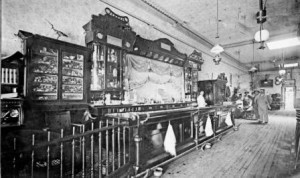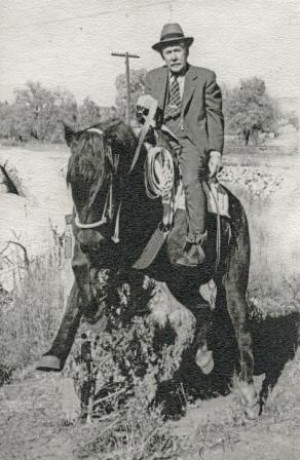By Brad Courtney
It was called "a dastardly deed.” The work of a demon. It was human emotion gone terribly wrong, and at that time considered the greatest atrocity in Prescott’s 32-year history.
 On Sunday night, June 28, 1896, people were enjoying the usual delights—gambling, a spirited drink and conversation—offered by the Cabinet Saloon. The “Cabinet” was the heartbeat of early Whiskey Row, and during this time still one of the two most popular saloons in Prescott. It would become the Palace Hotel and Bar after the Prescott fire of 1900.
On Sunday night, June 28, 1896, people were enjoying the usual delights—gambling, a spirited drink and conversation—offered by the Cabinet Saloon. The “Cabinet” was the heartbeat of early Whiskey Row, and during this time still one of the two most popular saloons in Prescott. It would become the Palace Hotel and Bar after the Prescott fire of 1900.
In the rear of the Cabinet was a restaurant run by Chinese men. Two ladies were dining there. One was Bertha Hovey. At least that was what she was going by. Her companion was identified only as Cora. They were reported as “habitués of Granite street," which Prescottonians knew to mean they were prostitutes. Both were presently being served by a Chinese waiter. The lives of these three were about to dramatically change.
 At about 9:40, a deafening explosion erupted directly beneath Bertha and Cora. Cabinet co-proprietor Barney Smith leaped to his feet. One frequent patron named Tom had been participating in a game of dice. He was known for having rheumatism, but now seemed suddenly healed as he sprinted out the front door. The head chef of the Chinese kitchen immediately thought the Cabinet was being attacked by Highbinders. He howled to the heavens for help.
At about 9:40, a deafening explosion erupted directly beneath Bertha and Cora. Cabinet co-proprietor Barney Smith leaped to his feet. One frequent patron named Tom had been participating in a game of dice. He was known for having rheumatism, but now seemed suddenly healed as he sprinted out the front door. The head chef of the Chinese kitchen immediately thought the Cabinet was being attacked by Highbinders. He howled to the heavens for help.
The Highbinders were a semi-secret Chinese society, mafia-like in that they were involved in criminal activities such as prostitution and blackmail. Some were hired assassins. Most of the Chinese in Prescott, understandably, feared the Highbinders, who at times had indeed infiltrated Prescott’s Chinatown. The Highbinders would not have been happy that some of their own ethnicity were working for Anglo businessmen. But the Highbinders did not cause an explosion on this night.
All inside the Cabinet were dumbfounded. The explosion was so thunderous that hundreds outside the saloon rushed toward it to see what had happened. Some, including co-proprietor Barney Smith, suspected it was part of a robbery attempt, that the chaos was merely a planned distraction. Had robbers detonated the explosion? Were they now waiting to pounce and scoop up any money, or silver, on the gambling tables or blown to the floor, or in the register? Smith ordered Frank Williams, the popular barkeep, to stay near the money just in case.
But that was not the case either. No robbers targeted the Cabinet that night.
After everyone gathered their wits, the damage was observed, which extended into the bar area. Anything that could move in the Cabinet had been displaced. Tables and chairs were knocked flat, glass from the windows and liquor bottles covered the floor, and pieces of linoleum lay strewn everywhere. Those linoleum fragments would later tell a story. The dining room and kitchen were destroyed. Most astoundingly, the 1000-pound oven in the Cabinet kitchen had been knocked over.
It was obvious what had caused the explosion, and those present involved in mining work agreed they were enveloped in a familiar odor. Dynamite fumes filled the air. In fact, and mysteriously, some maintained there had been an unusual odor in the air before the blast.
There was no doubt that the death of somebody, or somebodies, was the intent of the one who had set off this explosion.
Incredibly, the two soiled doves and the Chinese waiter stood alive. One lady was harmed more than the other, but it was not clear as to which one: "One of the women is laid up for repairs, while the other is . . . uninjured, but the Chinese waiter has a bad wound on one of his legs.”
Considering the magnitude of the explosion and the collateral damages wreaked, their survival was deemed a miracle. Instant death would have been the expected result. In fact, neither lady had been thrown from the area in which they were sitting and didn’t realize at first that dynamite had been placed directly below them, or that they, or one of them, may have been the target.
Of course, the big questions were “Who?” and “Why?” Chief of Police Steve Prince immediately began an investigation.
Brad Courtney is the author of Prescott’s Original Whiskey Row.
“Days Past” is a collaborative project of the Sharlot Hall Museum and the Prescott Corral of Westerners International (www.prescottcorral.org). This and other Days Past articles are also available at www.sharlothallmuseum.org/library-archives/days-past. The public is encouraged to submit proposed articles to dayspastshmcourier@gmail.com. Please contact SHM Library & Archives reference desk at 928-445-3122 Ext. 14, or via email at dayspastshmcourier@gmail.com for information.


